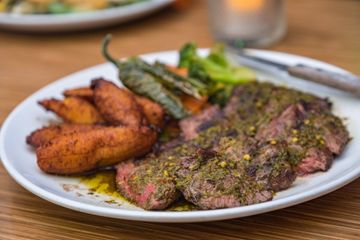Satisfy your cravings with take out and delivery from the top-rated Mexican restaurants near you
Is Mexican Food Healthy And Balanced? Unpacking the Nutritional Perks of Typical Ingredients
The inquiry of whether Mexican food is healthy invites an exploration of its conventional ingredients. Beans and corn function as fundamental staples, rich in healthy protein and fiber. Avocados supply helpful fats, while various herbs and spices add taste and health benefits - take out and delivery. Together, these elements develop a tapestry of nourishment. Nonetheless, the healthfulness of Mexican cuisine usually relies on prep work techniques and part dimensions. What role do these aspects play in identifying its general dietary worth?
The Power of Beans: Protein and Fiber-Rich Staples
Often overlooked, beans serve as a foundation of Mexican cuisine, using a wide range of dietary benefits. Rich in protein, they are an exceptional plant-based alternative for those seeking to fulfill their nutritional healthy protein requires. This high protein material sustains muscle mass fixing and growth, making beans very useful for both meat-eaters and vegetarians alike. Additionally, beans are a phenomenal resource of nutritional fiber, which aids in food digestion and advertises a feeling of fullness, potentially assisting with weight monitoring.
The variety of beans used in Mexican meals, such as black beans, pinto beans, and kidney beans, adds to a diverse taste account and can enhance dishes nutritionally. Beans are reduced in fat and consist of necessary vitamins and minerals, consisting of folate, magnesium, and iron. Together, these characteristics make beans a critical active ingredient, delivering both nutrition and sustenance in conventional Mexican fare.

Corn: a Versatile Grain With Nutritional Benefits
Corn stands apart as a functional grain basic to Mexican cuisine, celebrated not just for its cooking applications but also for its impressive nutritional profile. As a primary active ingredient in dishes like tortillas, tamales, and pozole, corn gives essential nutrients that add to a well balanced diet regimen. Rich in carbohydrates, it works as a considerable energy source, while likewise being low in fat, making it a positive choice for various nutritional needs.
Moreover, corn is a great resource of dietary fiber, which assists in food digestion and promotes satiety. It consists of substantial amounts of vitamins such as B-complex vitamins, which are important for basal metabolism. The presence of anti-oxidants, specifically carotenoids, adds to total health by lowering oxidative anxiety. In addition, corn is gluten-free, dealing with those with gluten sensitivities. In general, the nutritional benefits of corn highlight its importance in traditional Mexican food and its role in a healthy diet regimen.
Avocados: Healthy Fats and Nutrients in Every Bite
Avocados play a significant duty in Mexican cuisine, enhancing dishes with their velvety structure and rich taste. Past their culinary charm, avocados are commemorated for their remarkable dietary account. They are a rich source of healthy and balanced monounsaturated fats, which can help lower bad cholesterol levels and assistance heart health. Additionally, avocados are loaded with essential minerals and vitamins, including potassium, vitamin E, and B vitamins, adding to general wellness.
The high fiber content in avocados help digestion and advertises satiety, making them a valuable addition to any dish. Their special nutrient composition can also support skin wellness and supply anti-inflammatory advantages. Integrating avocados into traditional Mexican dishes or enjoying them as a standalone snack can boost both taste and nourishment, showing why they are a cherished staple in Mexican cuisine. In general, avocados offer a scrumptious method to delight in healthy fats and important nutrients in every bite.

Seasonings and Natural Herbs: Flavorful Health Boosters
While enjoying the rich tastes of Mexican food, one can not neglect the important function that spices and herbs play in improving both taste and wellness. Active ingredients such as chili, cilantro, and oregano peppers not just add to the vivid taste account however also give significant health and wellness advantages. Cilantro is understood for its purifying buildings, assisting to remove hefty metals from the body, while oregano is packed with anti-oxidants and has anti-inflammatory impacts.
Chili peppers, a staple in lots of Mexican meals, have capsaicin, which has been connected to enhanced metabolic rate and pain alleviation. Furthermore, seasonings like cumin and coriander support digestion and might assist in blood glucose policy. Including these flavorful wellness boosters right into dishes not only enhances the cooking experience yet additionally promotes general wellness, making Mexican food not simply delicious, however additionally nutritionally beneficial.
Traditional Food Preparation Techniques: Enhancing Nourishment and Flavor
Conventional food preparation techniques in Mexican food play an important function in enhancing both nutrition and taste, as they typically focus on classic techniques and fresh active ingredients. Methods such as nixtamalization, where corn is soaked and cooked in an alkaline option, not just improve the nutrient profile of tortillas however likewise boost their digestibility - take out and delivery. Additionally, the usage of slow cooking approaches, like cooking or braising, enables tastes to meld beautifully while go to these guys preserving the integrity of the components

Regularly Asked Inquiries
Are Mexican Food Portions Usually Larger Than Various Other Foods?
Mexican food portions are often bigger than those of many other foods. This particular mirrors typical eating techniques, highlighting common sharing and hearty dishes, which can bring about a much more substantial serving dimension on the whole.
Exactly how Does the Prep Work Technique Affect Healthfulness of Mexican Food?
Prep work techniques substantially affect the healthfulness of Mexican food. Strategies such as grilling or steaming preserve nutrients, while frying can raise undesirable fat material. Options of ingredients and cooking styles ultimately determine total nutritional value.
Can Mexican Food Be Tailored for Particular Dietary Limitations?
Mexican food can undoubtedly be tailored for specific dietary constraints. Substitutions, such as utilizing corn tortillas for gluten-free diet plans or incorporating more veggies, allow people to appreciate traditional tastes while fitting numerous nutritional demands.
What Are Common False Impressions Concerning Mexican Food and Health?
Usual false impressions concerning find this Mexican food include the belief that it is inherently undesirable, overly spicy, and exclusively concentrated on fats. In truth, conventional meals commonly feature nourishing active ingredients and can be tailored to various dietary needs.
Are There Healthier Options at Mexican Dining Establishments?
Healthier options at Mexican dining establishments typically consist of grilled meats, beans, and fresh veggies. Choosing dishes that highlight entire components and avoiding heavy sauces can bring about a much more healthy dining experience, advertising total health.
The selection of beans used in Mexican meals, such as black beans, pinto beans, and kidney beans, contributes to a diverse taste account and can improve meals nutritionally. Avocados play a considerable role in Mexican cuisine, matching recipes with their velvety appearance and abundant flavor. Including avocados into typical Mexican dishes or appreciating them as a standalone treat can enhance both flavor and nutrition, demonstrating why they are a cherished staple in Mexican cuisine. While delighting in the rich flavors of Mexican food, one can not ignore the necessary duty that spices and natural herbs play in enhancing both taste and wellness. Conventional food preparation techniques in Mexican cuisine play a crucial duty in boosting both nourishment and flavor, as they often focus on classic strategies and fresh ingredients.